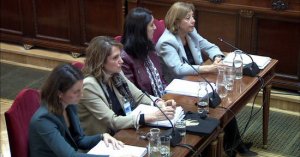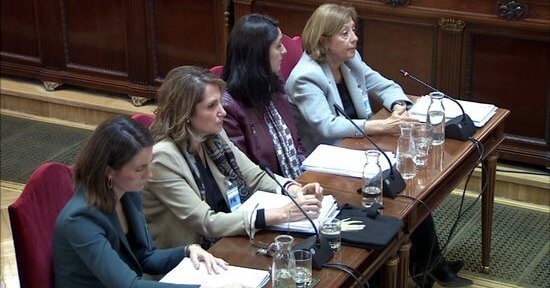The Catalan Trial started its 45th day on Wednesday morning at the Supreme Court in Madrid, with over 400 witnesses already having testified over 3 months.
Catalan Trial: click here full details of those accused, the charges, and the accusers.
Experts and specialists took the stand for cross-examinations by both the prosecutors and the defence teams, with the Supreme Court having agreed to look at written reports for the case.
The judges overlooked some of the complaints from defence lawyers, who called on the court to dismiss some experts on the grounds that they had not seen their reports before the session.
Giving evidence for the prosecution, in reference to the accusation of misuse of public funds, one expert from Spain’s tax office said it did not matter whether work commissioned – such as material for the referendum – was paid for or not, it still constituted an offence.
ALSO READ: Jailed Catalan leaders register as MPs in parliament
The experts also confirmed that publicity material commissioned for the 2017 referendum was actually produced, whether or not it was later paid for by public money.
The ‘expert phase’ is scheduled to last two sessions until Thursday, while three sessions have been allocated next week to the long-awaited documentary evidence phase.
The judges have spent months refusing to view footage of alleged Spanish police violence on 1 October 2017, despite repeated requests by the defence teams, insisting that the witness testimonies be cross-referenced.
ALSO READ: Jordi Sànchez: ‘Nothing we’ve seen in our trial justifies prison’
Instead, the court will see all the clips in the upcoming separate phase of the trial, during which lawyers on neither side will be permitted to comment on the footage nor relate them to the earlier witness statements.
Once this part of the trial is complete, both the prosecutors and defence teams will present their final reports, in which they will make their proposed verdicts, and the prosecuted individuals will have a final word before the trial is ready for judgment.
The verdict is not expected to be out before the summer break in August.
ALSO READ: Junqueras stopped from joining EU election TV debate
The first witness on Wednesday was Jordi Martínez Soler, a social media advisor for the Catalan Parliament, who answered questions about whether he or Carme Forcadell, the former president of the Parliament, decided upon the content that he tweeted.
Next up was Ricard Gené, who was part of the Catalan National Assembly (ANC)’s secretariat at the same time as Carme Forcadell.
Gené explained that the role of Forcadell, currently accused of rebellion, in the pro-independence organisation ANC was as a ‘representative and not an executive’.
‘Forcadell was not involved in elaborating pro-independence ANC’s roadmap,’ he said.
ALSO READ: Catalan trial: controversy over ‘rebellion’ and violence
Next to testify was Rosa Maria Sans, who works at the Catalan Department of Labour, Social Affairs and Families, and who is in charge of managing the use of government facilities and equipment by non-profit organisations.

Enric Vinaixa, next to testify, also used to work for the Department of Labour, Social Affairs and Families. He was asked to declare as a witness by the defence of Dolors Bassa, the former minister who is accused of rebellion.
Next to testify was Àngel Cortadelles who was the head of services at the Catalan Justice Department during the time of the referendum and was called in by the defence of Carles Mundó. Mundó, the Catalan ex-Justice Minister, is accused of misuse of public funds and disobedience.
Four experts were called to testify by the Spanish State’s legal counsel and the prosecution service about reports they drafted on the misuse of public funds. At this point, lawyers for the defence said that they had not received a copy of the report the experts were supposed to testify on. Supreme Court Magistrate Manuel Marchena ordered a recess to determine whether this would suppose the ‘defencelessness” of the prisoners.
ALSO READ: ‘Fairy trap’ goes viral after Enric Millo’s testimony
After the recess, the trial continued. Marchena had determined that the prisoners were not ‘defenceless’ because they had not received a copy of the experts’ report.
‘Whenever there is something commissioned by the government and it is executed by a contractor, the government will always have the obligation to pay for it,’ testified one of the Spanish tax office public servants.
If the administration does not pay for something commissioned, an ‘irregularity’ and ‘unjust enrichment are committed’, added the Spanish tax official.
‘A negative invoice does not imply the obligation has been removed nor does it mean that the service has not been provided,’ she added.
ALSO READ: The ‘Jordis’ can now appeal to EU Court of Human Rights
The tax expert witnesses continued to discuss the financial aspect to the case. They said the Catalan government (via Diplocat) made payments to international referendum observers. There was also a debate over which public adverts were directly or indirectly related to the vote.
The next two witnesses, John Paul Lederach and Jesus Castañar, were experts on the distinction between violent and non-violent action. They had assessed the footage [of the 20 September 2017 protests] according to their theories on what constitutes violence.
Both Lederach and Castañar testified that the protests on 20 September 2017 were an ‘act of persuasion’ and not an act of civil disobedience. They said there was no violence committed against police officers and no attempts to seize public buildings.
Catalan Trial: click here full details of those accused, the charges, and the accusers.
Click here for all articles and updates on the Catalan Trial
ALSO READ: Catalan Trial: Day 44 summary
ALSO READ: Catalan Trial: Day 43 summary
ALSO READ: Catalan Trial: Day 42 summary
ALSO READ: Catalan Trial: Day 41 summary
ALSO READ: Catalan Trial: Day 40 summary
ALSO READ: Catalan Trial: Day 39 summary
ALSO READ: Catalan Trial: Day 38 summary
ALSO READ: Catalan Trial: Day 37 summary
ALSO READ: Catalan Trial: Day 36 summary
ALSO READ: Catalan Trial: Day 35 summary
ALSO READ: Catalan Trial: Day 34 summary
ALSO READ: Catalan Trial: Day 33 summary
ALSO READ: Catalan Trial: Day 32 summary
ALSO READ: Catalan Trial: Day 31 summary
ALSO READ: Catalan Trial: Day 30 summary
ALSO READ: Catalan Trial: Day 29 summary
ALSO READ: Catalan Trial: Day 28 summary
ALSO READ: Catalan Trial: Day 27 summary
ALSO READ: Catalan Trial: Day 26 summary
ALSO READ: Catalan Trial: Day 25 summary
ALSO READ: Catalan Trial: Day 24 summary
ALSO READ: Catalan Trial: Day 23 summary
ALSO READ: Catalan Trial: Day 22 summary
ALSO READ: Catalan Trial: Day 21 summary
ALSO READ: Catalan Trial: Day 20 summary
ALSO READ: Catalan Trial: Day 19 summary
ALSO READ: Catalan Trial: Day 18 summary
ALSO READ: Catalan Trial: Day 17 summary
ALSO READ: Catalan Trial: Day 16 summary
ALSO READ: Catalan Trial: Day 15 summary
ALSO READ: Catalan Trial: Day 14 summary
ALSO READ: Catalan Trial: Day 13 summary
ALSO READ: Catalan Trial: Day 12 summary
ALSO READ: Catalan Trial: Day 11 summary
ALSO READ: Catalan Trial: Day 10 summary
ALSO READ: Catalan Trial: Day 9 summary
ALSO READ: Catalan Trial: Day 8 summary
ALSO READ: Catalan Trial: Day 7 summary
ALSO READ: Catalan Trial: Day 6 summary
ALSO READ: Catalan Trial: Day 5 summary
ALSO READ: Catalan Trial: Day 4 summary
ALSO READ: Catalan Trial: Day 3 summary
ALSO READ: Catalan Trial: Day 2 summary
ALSO READ: Catalan Trial: Day 1 summary


